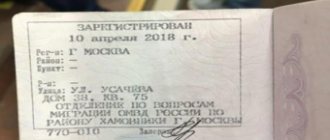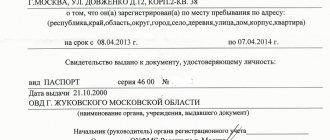What is registration (registration)
Citizens of Russia have the right to move freely within the country and live where they wish, but by registering their place of residence.
Previously, registration actions in relation to assigning a person to his place of residence or stay were called registration. Now this word continues to be used in everyday speech, understanding a new meaning enshrined in law. Registration or its absence does not limit or expand the possibilities for people to exercise their rights and freedoms, but the presence of registration makes it easier for a person to find a job, receive medical care and interact with various authorities.
Registration may be permanent or temporary. Temporary registration is done in rented apartments or houses, hotels, holiday homes, boarding houses, on long-term business trips and other similar cases.
The principle of registering children under the age of majority
The Family and Civil Codes require the registration of minor children under 14 years of age at the place of residence of their parents or other official guardians. Upon reaching 14 years of age, a child has the right to register with their written permission in any place.
It should be noted that a child under fourteen years of age is registered at the place of registration of his legal representative without the participation of the homeowner.
The procedure for registering a child’s temporary registration can be clarified with the authorities authorized to carry out this procedure:
- At the passport and visa service department.
- In the nearest multifunctional center.
- On the government services portal.
When moving for temporary residence to rented housing, you need to take care of the child and ask the owners about the possibility of his registration, and for what possible period of time.
Having received information about the procedure for temporary registration and collected the required documents for registration, you need to arrive at the registration authorities. To register a child at the place of residence of the parents or one of them, you must provide:
- parents' identity card (passport);
- child's birth certificate;
- a document confirming the rental or rental of housing;
- consent of the owners of the premises for temporary registration.
Important! Temporary registration does not provide for the termination of permanent registration.
For how long should I register?
Applying for a temporary registration only for the month in which you apply for admission to school is not the best solution. Such actions will only work if the administration does not monitor this issue. The optimal decision for how long you need to apply for a temporary registration for a school is for the period from February, when you apply to the school, until October. In this case, parents will not have to worry about possible refusal. After the registration period expires, the child will be automatically deregistered.
Responsibility for lack of registration
The Code of Administrative Offenses provides for punishment for non-compliance with the legislation on registration at the place of residence or stay of citizens. Articles 19.15.1 and 19.15.2 of the Code of Administrative Offenses contain a fairly extensive list of possible violations and corresponding sanctions.
If you change your place of residence, you must register within 7 days from the date of termination of registration at your previous address. You must register at your place of stay if you are on a business trip, trip, on shift, etc. for more than 90 days.
If the rules for registering citizens are violated, administrative punishment is imposed not only on the culprit, but also on the owner of the premises where the violator resides.
Peculiarities of registration of minors
According to current legislation, until the age of 14, the place of residence of children is recognized as the place of registration of their legal representatives. If the parents live separately and are registered, the child is registered with only one of them.
When registering a minor at the place of residence of both or one of the parents, obtaining the consent of other residents of the living space or owners is not required.
Is it possible to register a child separately from his parents?
A teenager over 14 years old is recognized in Russia as having limited legal capacity. With the written consent of the legal representatives, a child who has not reached the age of majority, but is over 14 years old, can register separately from them. Consent will be sufficient from one of the parents. Together with the parents, the child submits an application for registration to the passport and visa service or to the MFC, where the written consent of the legal representatives is also issued.
This is important to know: Features of registration of a newborn child
Temporarily, a teenager can register in the living space of a close relative with confirmation of the fact of relationship.
Duration and cost of registering a child at the place of stay
The procedure for temporary registration itself takes several days. It will take 3 days to complete the documents. Delays may occur only for technical reasons, but not for long.
For residents of Russia, registration is done without paying a state fee. Citizens of another country, when registering permanently at their place of residence, will have to pay a small state fee of 350 rubles, and temporary registration is also done without paying for the service.
Upon expiration of the period of temporary registration of a minor at the place of stay, he will automatically be deregistered the next day. You will not have to take any additional steps to terminate your registration.
If you need to cancel your temporary registration ahead of schedule, you will need to:
- application on behalf of one of the parents;
- his identity card (passport);
- written approval of the cancellation of registration from the second parent;
- the child's birth certificate or passport, if you already have it.
Cancellation of temporary registration is even faster, on average it will take one day.
Is it possible to register a child separately from his parents?
In the hour of intense debate, the place of living young children is taken to respect the position of their fathers until the end of their father's obligations, the special health of the child to the skin of them, the age of the child, the state of health. and other furnishings that have a deeper meaning.
Thank you. But here’s the question: if a child is registered in Crimea with his mother, does this require the permission of the father, who remains and is registered in Kyiv? I will say right away that it is unlikely that my father will give such permission. The family is in the stage of collapse, so conflicts and emotions are through the roof. But they are not divorced yet.
Procedure for admitting a child to school. Why temporary registration may be needed
The Law “On Education” defines the general principles and conditions for the admission of children to educational institutions. The “Procedure for Admitting Citizens to Study,” approved by the order of the Russian Ministry of Education and Science, specifies these rules. The country has introduced a territorial principle for admitting students to schools. The first to be enrolled are children living in the territory assigned to the educational institution. After accepting this category of children and subject to the availability of free places, the remaining applicants are accepted.
To confirm your right to priority enrollment in a school, you will need a certificate of registration at your place of residence. For those who live in another territory and do not have such a certificate, temporary registration at a suitable address can help.
Important! You should be aware that if temporary registration is issued at an address close to the place of permanent registration, this may arouse suspicion and, at best, the child will not be accepted into the chosen school.
What does the owner risk by temporarily registering a minor?
By law, children must be registered where their parents live, and the consent of the property owner is not required for these actions. This creates certain risks for the property owner .
A typical example of this: a citizen entered into a rental agreement and moved into an apartment with his child. Following this, he carried out temporary registration at this address for himself and for the child. The tenancy agreement has expired, there are no grounds for extending the temporary registration of the employer, but only through the court can the minor be re-registered at the same address. As a result, the owner will not be able to sell or otherwise dispose of his apartment while a child is registered in it, albeit temporarily.
To avoid such disputes, the terms and conditions must be carefully spelled out in the rental agreement. After all, according to the law, if the parents do not have permanent registration anywhere, the child cannot be discharged into the void. In the court of first instance, the owner of the property will most likely be denied the forcible eviction of the child.
A similar situation may arise when a newborn (adopted or taken into custody) child appears to a family that has moved into an apartment. With the arrival of the baby, the parents will temporarily legally register him at their place of residence, and for this they will not even need to obtain the consent of the owner of the home.
How and where to get a temporary registration for a child
If the parents or one of them already have temporary registration, then the child will have to register with him, since children under 14 years old cannot do this separately by virtue of the law. In order to temporarily register a child in the required territory, you will have to find an owner who is willing to temporarily provide his housing, at least for an adult.
Expert opinion
Alexandrov Dmitry Petrovich
Practicing lawyer with 15 years of experience. Specializes in family law
It will be possible to register a minor with his parent later without the consent of the owner. An application for a child is filled out by his father or mother. Temporary registration is issued at the passport and visa service, multifunctional center or on the State Services portal. The period for registering children cannot exceed the period allowed by the owner or renter for their parents.
This is important to know: Registration without the right to living space: permanent and temporary, registration agreement
Documents required for temporary registration of a child
Registering at your place of residence will not be difficult if you provide the registration authorities with a package of documents:
- parent's identification document, usually a passport;
- child's birth certificate;
- title document for housing or the owner’s application for permission to register;
- If children 14 years of age and older are registering with one parent, the consent of the other may be required.
An application form to be filled out is issued by an employee of the passport and visa service on site or it is filled out by the employee himself if the MFC is selected for submitting documents. When submitting an application through the State Services portal, the form is filled out electronically by the applicant independently.
It takes 3 days to prepare the registration certificate. There is no state fee for the service.
Possible difficulties when registering a child
The owner who has provided his premises for temporary registration should remember the possible complications that may arise due to a rash decision.
Consequences of obtaining a fictitious registration
If the registration at the required address is fictitious and the child lives at the place of permanent registration, then if such a fact is revealed, criminal liability may be applied to the citizens who committed the offense.
Parents who seek to place their child in their chosen school by any, sometimes illegal, means, and those who assist them in this, should think carefully about the consequences.
Consequences of fictitious registration
Fictitious registration means:
- registration by providing false information or documents;
- no intention to live on the premises (i.e. the person does not actually live at the address).
For fictitious registration, criminal liability is established - a fine of 100 thousand to 500 thousand rubles (Article 322.2 of the Criminal Code of the Russian Federation).
Temporary registration of a minor on school grounds increases the chances of admission to an educational institution. The procedure should be carried out in accordance with the law in order to avoid getting into an unpleasant situation.










